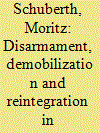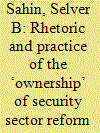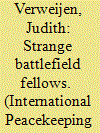|
|
|
Sort Order |
|
|
|
Items / Page
|
|
|
|
|
|
|
| Srl | Item |
| 1 |
ID:
153529


|
|
|
|
|
| Summary/Abstract |
Culture has recently become a significant aspect of military operations; the ability to win ‘hearts and minds’ of a local population is gained through cultural awareness, a product of cultural intelligence. This article aims to discuss the role of culture during peace operations in particular, and population-centric military operations in general. In this context, the concept of cultural intelligence is discussed through the concepts of ‘power’, ‘intelligence’, and ‘culture’. The theoretical discussion raises the importance of cultural intelligence for the exercise of soft and smart power in operational areas. NATO’s International Security and Assistance Force (ISAF) in Afghanistan was chosen as a case study and the data were collected through interviews with an expert group of 45 individuals. These interviewees with field experience in peace operations provided a foundation for widening the theoretical approach. The article concludes with the interpretation of the obtained data. The research findings prove that the skill of conquering people’s hearts and minds in operation environments can be developed through cultural intelligence, and military leaders/political decision-makers should not neglect cultural intelligence as a soft power tool in peace operations as well as in population-centric military operations.
|
|
|
|
|
|
|
|
|
|
|
|
|
|
|
|
| 2 |
ID:
153528


|
|
|
|
|
| Summary/Abstract |
Disarmament, demobilization and reintegration (DDR) programmes form part of standard post-conflict peacebuilding tools regularly applied in the context of UN peacekeeping operations. Yet, the limitations of such templates become evident when peacebuilders are confronted with unconventional settings, such as the urban environment. So far, there is a scarcity of research on UN-led DDR efforts in cities, even though the proliferation of urban armed groups is projected to pose an intractable challenge for decades to come. Based on six months of fieldwork in Port-au-Prince, this article presents new empirical evidence on innovative DDR programming in Haiti, the only country where a United Nations Stabilization Mission (MINUSTAH) tried to implement a traditional DDR programme for gang members. As this attempt proved to be a failure, the mission subsequently changed its approach to a more community-focused armed violence reduction and prevention programme which aims to disincentivize at-risk sections of the population from joining gangs. Even though the current community violence reduction approach is better adapted to the unconventional conflict environment in Haiti and is seen by many practitioners today as a role model, it shares a number of limitations with traditional DDR programmes and is not a panacea for urban peacebuilding.
|
|
|
|
|
|
|
|
|
|
|
|
|
|
|
|
| 3 |
ID:
153527


|
|
|
|
|
| Summary/Abstract |
Why has the perennial idea of a permanent, individually recruited UN force never been realised? Scholars have responded to this question by interrogating the attributes of the various ideas but this only provides a partial answer. This article explores the latest proposal for a UN standing force – the UN Emergency Peace Service (UNEPS) – through the lens of a transnational advocacy network (TAN) and the external issues affecting its ability to put the idea on the UN’s agenda. It engages with social movement literature, and draws on interviews with those in the campaign to establish a UNEPS, participant observation, and analyses of primary and secondary sources. It argues that, in addition to contentions surrounding aspects of the UNEPS proposal, the failure to leverage the expertise of all network members and the lack of geographically diverse advocates, partly explain the inability of the TAN to achieve its goals. While there were some political opportunities, such as the support of influential allies and focusing events, an inhospitable political and normative climate, the lack of a state champion, UN body and journalists further contributed to the demise of the campaign.
|
|
|
|
|
|
|
|
|
|
|
|
|
|
|
|
| 4 |
ID:
153530


|
|
|
|
|
| Summary/Abstract |
Successful outcomes in security sector reform (SSR) implementation are often conditioned on two key inter-related operational principles: international agencies’ understanding of the ‘local context’ where they intervene and their encouragement of the country ‘ownership’ of the institutional reforms they advocate. Outcomes, however, are determined by power, and different patterns of outcomes are likely to emerge from different types and degrees of power exercised by a multiplicity of actors operating in a dynamic political and social context. Drawing upon these inter-connections between outcomes and power, this article examines Kosovo’s security sector development experience since 1999. It argues that depending on types of, and changes in, power-based interplays between international and domestic forces, different patterns of ‘ownership’ have emerged in the context of SSR implementation in Kosovo.
|
|
|
|
|
|
|
|
|
|
|
|
|
|
|
|
| 5 |
ID:
153526


|
|
|
|
|
| Summary/Abstract |
The literature on peacekeeping has paid scant attention to the interaction between peacekeeping troops and host country military. Addressing this gap in scholarly knowledge, this paper conceptualizes such interaction as ‘diagonal interoperability’. The latter is situated in-between ‘horizontal interoperability’ on the one hand, relating to interaction between different components of a peacekeeping mission, and ‘vertical interoperability’ on the other, referring to the relations between international peacekeepers and ‘peace-kept’ populations. The paper focuses on the Democratic Republic of the Congo, where UN forces and the Congolese army are engaged in joint military operations and army reform is part of the peacekeeping mission’s mandate. Studying both mutual representations and joint practices, the paper explores the organizational, political, discursive, and security-related factors that shape diagonal interoperability. It concludes that diagonal interoperability between the two forces is weak, as reflected in mutual distrust and ‘not-so joint’ joint operations. Perhaps surprisingly, it finds that shared military identities do not seem to facilitate collaboration. Rather, mutual perceptions of the ‘military Other’ are infused with discourses of cultural and political difference, therefore accentuating the power asymmetries that undermine diagonal interoperability.
|
|
|
|
|
|
|
|
|
|
|
|
|
|
|
|
|
|
|
|
|